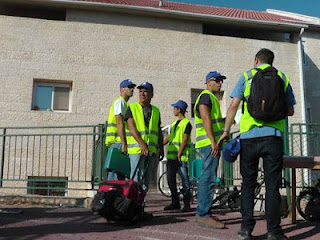The Ulpana, Beit El: What’s The Big Deal? You’re Just Moving House…
Today,
fifteen families were evacuated from their homes in The Ulpana Neighborhood of Beit El.
As I
listened to the radio this morning the interviewer asked one of the evicted families
“what’s the big deal? So you’re moving house…!”
Perhaps
he was ‘just’ being facetious and provocative – radio interviewers are, after
all, first and foremost in the entertainment industry.
On
the other hand, taken at face value, the question astounded me.
It
is true that being evicted from your home entails the same physical process as
voluntarily moving home.
Finding
a new place to go, packing your possessions, saying goodbye to the neighbors,
etc.
In
the same way that rape involves the same physical act as making love.
Or
stealing an object involves the same physical process as borrowing it.
In
an apparently unconnected context, a local RBS rabbi wrote, regarding the infamous Bet
Shemesh spitting incident in January 2012:
Poor 8
year old Naama Margolese. If my child was spat at, I would wipe the spittle
off, gently, wipe away her tears, give her a piece of her favorite chocolate,
tell her there are bad men in the world, and in 10 minutes it is over.
The
missing element from these parallels (rape = making love etc) is Violation.
Violation
and Trauma make all the difference in the world to the rape victim, the victim
of a robbery, and an 8 year old girl who is spat at, in hate, by a rabbinical
looking man.
Violation
and Trauma is also the difference between “moving house” and being evicted from
your home in Beit El by the Government of Israel.
I
have had the privilege of working closely with families who were among the 9000
Jews evicted from Gush Katif in 2005. Almost
seven years later, the wounds are still raw. Their sorrow is still worn on
their sleeve. The trauma is ever-present.



The broadcaster and listeners need to imagine what it'd be like to have the equipment removed mid-broadcast as someone orders the show host to "chill" and to make the show work from inside a location that lacks necessities as he/she pays all coerced relocation costs. If the show fails due to these counterproductive complications, blame the victim but not the tyrants who destroyed the show and someone's career. Sheesh.
ReplyDeleteI think you're mistaken. The families (at least most of them - I think I saw that two are still not agreeing to go) agreed in the end to leave. Whether it's because they thought they (i.e. the community) got a good deal, or they were convinced by their leadership, or because they thought they had no choice - they agreed. They were not violated in the way you describe, which would be a more apt comparison to summer 2005.
ReplyDeleteDavid,
ReplyDeleteDoes the "tzedek" in your blog title only refer to tzedek for Jews or for everyone? What about the tzedek for the real owner of that land (as determined by our highest court).
I feel for the families that had to move, that can't be easy, but the principle of tzedek for our country must take priority. If someone had your stolen property, wouldn't you want it back? Tzedek Tzedek!
Joel - There is no claimant, and no proof to any claims of ownership. The post-Zionist High Court had to invent their own default ruling that all land over the "Green Line" is considered "private Palestinian land" unless proven otherwise, in order to ensure the destruction of the Jewish homes.
ReplyDeleteJenny - no-one left because they WANTED to leave. They were forced. That they were forced to leave QUIETLY doesn't make it any less of a violation.
ReplyDeleteJoel - Jewish tzedek primarily applies to Jews. Of course it also guides our relationship with non-Jews, and so stealing from non-Jews is also forbidden.
In the case of this land, it was NOT stolen from non-Jews - it was not proven by the standards of the court to belong to Jews.
No Palestinian will receive "his land back" due to this eviction.
There is absolutely no tzedek in this eviction - any way you look at it.